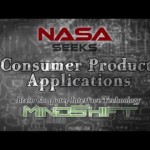 As well as being an organization that makes, and does, some of the coolest things on the planet, space agency NASA have also been at the forefront when it comes to going about innovation in a slightly different way. For instance, last year they hosted the worlds largest ever hackathon, with over 9,000 people and 484 organisations from around the world coming together both online and offline to tackle a series of challenges.
As well as being an organization that makes, and does, some of the coolest things on the planet, space agency NASA have also been at the forefront when it comes to going about innovation in a slightly different way. For instance, last year they hosted the worlds largest ever hackathon, with over 9,000 people and 484 organisations from around the world coming together both online and offline to tackle a series of challenges.
They’ve also been extensive users of citizen science, primarily via the CosmoQuest website, where the public join with professionals to try and spot craters on the moon from amongst photos taken by NASA’s Lunar Reconnaissance Orbiter.
They’ve even jumped into the social learning sphere recently via a partnership with Khan Academy. The partnership will see a range of video tutorials created that are designed to engage students in the kind of scientific and mathematical protocols used by NASA every day.
Their latest venture into crowdsourcing sees them team up with Edison Nation and Marblar to develop a range of consumer technologies. Central to the open innovation challenge NASA are running with Edison Nation is what’s known as Mindshift. This is a device that monitors brain waves and provides feedback to a machine. NASA have a good idea what they personally can use this machine for, but they’re turning to the crowd for alternative uses. It’s a really nice example of the kind of recombinant innovation that I’ve written about a few times before on the site.
The project will see the Mindshift technology opened up to the crowd with the only request being that the crowd come up with some feasible uses for it. Those ideas will then be turned into products via the collaboration with Marblar. The nice thing about the project is that a range of commercial options are available for participants.
Generating an idea is the easiest way to participate, and comes with no commercial strings attached. Alternatively, users can license the technology and create a company around their idea to commercialize it. There is also a royalty option available too, so plenty of ways for inventors to work closely with NASA on this.
It’s yet another example of how NASA is taking to crowdsourcing in a big way, and if an organization with as many smart people as NASA have can see the benefit of this, it really does beg the question of why your own organization can’t. Check out more about the project via the video below.
NASA are cool, and it's great to see them supporting open innovation. It would be just as cool if they opened the IP for any products generated.
I must say, it's pretty cool that an org like NASA are accepting that they don't have all the answers.